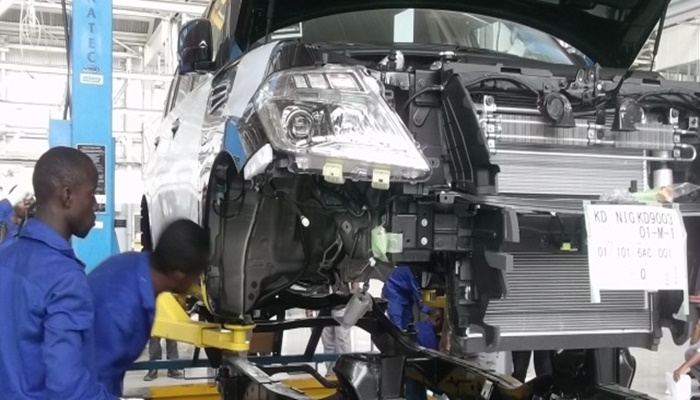
In spite of the Federal Government’s insistence to achieve good implementation of its auto policy to reduce the importation of fairly used vehicles otherwise known as Tokunbo cars into the country, some stakeholders have applauded the recent announcement by the Federal Government through National Automotive Design and Development Council (NADDC) to introduce credit scheme to local auto manufacturers.
Speaking in Lagos the Director, Policy and Planning of NADDC, Mr. Luqman Mamudu, disclosed that for the Federal Government to achieve its auto policy , the government through the NADDC have planned to launch a credit purchase scheme to give opportunities to Nigerians to purchase locally assembled vehicles, which is going to cost about N7.5 billion interest free rate into the scheme with a counterpart funding from a company in South Africa to help Nigerians get access to affordable an new vehicles.
“This is what we have been working on for the past two years. We looked at the available access to asset financing in the country, we found out that the high interest rate is frustrating the purchase of a new vehicle. This is the gap we want to fill. We are currently working with a company in South Africa which has footprints in 8 African countries where they have developed a commercial and financial model to get recoup their investment”.
He said the council is planning to build capacities in local assembling to attract component manufacturers to set up their factories in Nigeria.
“We are building three laboratories costing about N3 billion in Lagos, Kaduna and Enugu. The one in Lagos is an emission testing laboratory to test for the level of emission. We are almost 90 per cent complete. We also have a component part manufacturing testing laboratory in Enugu. We are doing all these to prepare for the next stage of component development because this is where job opportunities are enormous, but the entire process requires patience on the side of government and investors,” he stated.
“We have to encourage these Original Equipment Manufacturers (OEMs) to come with their capacity. If we create the right environment for them, they will come with their capacity to produce here and if this happens, we can export from here to earn foreign exchange. We are calling on the OEMs to use Nigeria as a hub for the whole West Africa, but we must be steady and focus so that we do not lose the opportunity,” he said.
He noted that Nigeria currently has the capacity to assemble 384,000 vehicles, but stressed that only 25,000 vehicles have been assembled so far, pointing out that the Federal Government will continue to pursue strategies to stop the influx of second hand vehicles into the country, noting that this scheme will go a long way to give alternatives to people who patronizes fairly used cars.
Speaking on the scheme, an economist and private sector advocate, who is also the Director-General of the Lagos Chamber of Commerce and Industry (LCCI), Mr.Muda Yusuf said that the policy, which has attracted investment from about 45 assemblers and part builders such as, Toyota, Ford and Volkswagen was laudable.
According to him, government must look at policies that will rather perk up the economy and help people survive current challenges being witnessed in the country than the ones that further bring hardship.
On the banning of ’Tokunbo’ or increasing tariff on vehicle in the country; he said is not realistic right now. Even in advance economies, fairly used vehicles are still being sold.”
Chairman, Nigeria Automotive Manufacturers Association, Mr. Tokunbo Aromolaran, in a telephone conversation disclosed that the investors in the Nigerian auto manufacturing segment were indeed hopeful and that’s why there is still tremendous activity in the automotive sector in spite of very difficult operating environment of policy uncertainty, dearth of skilled labour, poor infrastructure and scarce foreign exchange.
He stated that government needs to demonstrate in double quick time its conviction that support of the auto policy is good for this country. This will assure investors that government is a continuum and policies will not be dumped for the sake of ‘change’. Investors will only respond when they perceive a stable and supportive industrial environment.
Aromolaran further explained that the relatively unavailability of foreign exchange and the fluctuation experienced lately in the money market, the OEMs still can’t operate at optimal capacity with the level of patronage. “We need volumes to drive down unit cost of vehicles and when viewed against the economics our industry, the environment has be right with good policies, implementation of the auto policy, enhanced purchasing power, introduction of consumer credit, government patronage and above all, restriction of imports including used car imports”.
He said that successive governments in Nigeria have over the years battled to move our economy forward, employing different strategies and ploys to energise the docile state and create value to sustain a decent livelihood for the present and future generations of Nigerians.
“It is time for the government to reel out policies needed to assist OEMs to operate optimally and empower patrons too. What we need is that inspiration to acquire capacity to expand our facilities and produce more units at lower prices and consequently move towards global competitiveness and self-sustainability. It is also important the government enhances consumers’ purchasing power and implement the needed policies to assist the OEMs to produce quality and affordably priced vehicles,” he said.







Comments are closed.